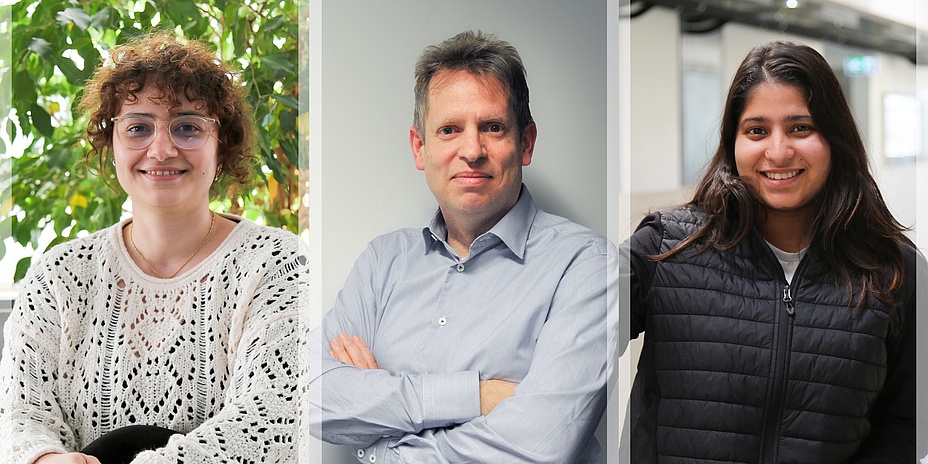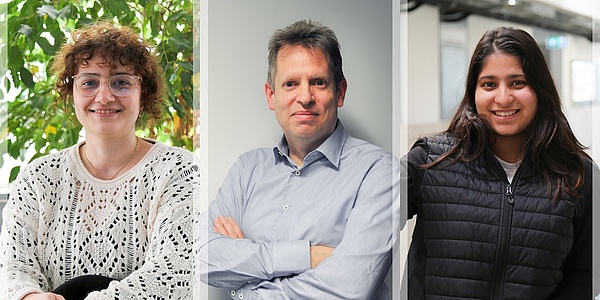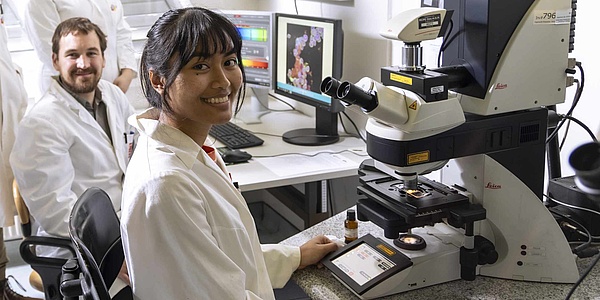Halfway around the World to TU Graz

More than 800 TU Graz employees come from countries other than Austria, which is over a fifth of all employees. People from 74 nations are currently represented. Colleagues from Germany, Italy and Croatia are frequently drawn to TU Graz from within the EU; outside the EU, Bosnia, Iran and India are the most common countries of origin. TU Graz people has portrayed three colleagues on behalf of the large international community at our university.
Aikata
When Aikata saw a PhD opportunity at TU Graz, she didn’t hesitate to apply – even though she had only just finished her bachelor’s degree at the Indian Institute of Technology Bhilai (IIT Bhilai). ‘I am focusing on cryptography and TU Graz researchers have a very good reputation in this field,’ she explains the reason for choosing our university. The young woman’s application was successful and in 2020, Aikata came to Graz, where she first finished her master’s degree and is now working on her dissertation at the Institute of Information Security. Both the institute’s staff and the organisational unit International Office – Welcome Center helped Aikata before her arrival and continue to support her during her time in Graz.
Both universities offer a high-quality education. The main difference in student life is that in IIT Bhilai, students live in hostels on campus. That creates a lively atmosphere.
‘Both universities offer a high-quality education,’ Aikata says when comparing her experiences in higher education in India with those in Austria. ‘The main difference in student life is that in IIT Bhilai, students live in hostels on campus. That creates a lively atmosphere.’ Compared to India, students in Austria have a lot of flexibility when it comes to course selection, class attendance, and exam dates, Aikata states. ‘In working life, however, there is kind of a nine to five routine everywhere.’
Aikata discerns several differences between living in India and Austria. ‘I feel much safer in Graz, and the city is very accessible, you can walk almost anywhere. I’ve also taken up hiking since I’ve been here.’ The main things Aikata misses about India are the street food culture and her parents. ‘I usually take one month off a year to visit them.’ When back in India, two things Aikata misses are ‘gefüllte Paprika’ (stuffed peppers), which she has come to like in Austria, and people adhering to traffic rules. ‘I have gotten used to it, so now it seems harder to cross the street safely in India.’
While being with her parents is the definition of home for Aikata, Graz also gave her a lot of amazing friends who make it feel like a second home. ‘I especially like walking to Seifenfabrik and visiting the café next to the river.’ Coming to Austria – and thus travelling around half the globe – was the first time for Aikata to visit a new country. ‘I’ve definitely become more self-reliant since then, it’s easier for me to adapt. And I think it’s very important to make friends in a new place so you can explore it together.’
Klaus Schliep
‘Actually, I was never a nomad. I spent the first thirty years of my life solely in Munich,’ laughs Klaus Schliep. The biomathematician can now look back on decades of experience abroad. As a German, he did his doctorate at Massey University in Palmerston North in New Zealand, spent years doing research in Paris (Natural History Museum and Pierre and Marie Curie University) and in Spain (University of Vigo), before ending up in the USA as a postdoctoral fellow. When a senior scientist position was advertised at TU Graz in 2019, he returned to Europe. ‘I really enjoyed working at the University of Massachusetts in Boston; my supervisor had good contacts at Harvard and the research was exciting. But I found everyday life difficult. Boston is such a huge city, life is expensive, and public transport doesn't work.’ He immediately felt at home in Graz and at the institute, even though the Covid lockdown began three months after he started work.
He also finds TU Graz, as well as the city of Graz, to be very open, ‘much more international than my home city of Munich.
‘My day-to-day work at TU Graz is not particularly different from my other jobs.’ Here at the Institute of Molecular Biotechnology, he also speaks English for the most part with colleagues and students, and the work ethic is high, just like in Spain. The biggest difference is that hierarchies are flatter in the English-speaking world. ‘The professor goes for a coffee with the students, everything is very informal. New Zealanders are also very open-minded, which has left its mark on me.’ He also finds TU Graz, as well as the city of Graz, to be very open, ‘much more international than my home city of Munich’. What does he miss most of all? ‘The sea and good Asian food, just like in New Zealand.’ Instead, Klaus Schliep has discovered his weakness for regional delicacies and farmers' markets in Graz, where he can be found every Saturday. He now feels at home at TU Graz. The researcher has bought a flat here. However, he would advise all students and researchers to gain experience abroad. ‘You can learn this from the USA, where it is common to do your BSc and MSc at other (also international) universities. A semester abroad is not enough to really get to know the mentality.’
Shiva Pouya
‘The first thing I liked about Graz is that everything is nearby! I can commute anywhere by foot or by bike, and that is really great for my work-life balance’, says Shiva Pouya with a beaming smile. Originally, she is from Iran and used to live in Tehran, where she studied Software Engineering and worked as a developer, and she later came to Budapest, where she studied Animation and gained more work experience. In the summer of 2023, Shiva Pouya started to work at TU Graz in the organisational unit Central Information Technology. Nowadays, she wouldn’t want to go back to living in a megacity: ‘There are many traffic jams and people are constantly in a rush. In Graz, people smile at you in the street. They are just not that stressed.’
Shiva Pouya enjoys the friendly and supportive work environment in her team. She considers the rather flexible working hours at TU Graz (‘Gleitzeit’) a huge benefit. ‘Even though much of my work is project-based – so some days I’m finished earlier, some days later – I had to adhere to the same exact working hours everyday at my previous jobs. I think it depends on the work culture of the company, though, more so than the country you work in.’ The developer also enjoys the broad range of in-house training the TU Graz offers for employees and is currently taking a German course.
What Shiva Pouya misses about Iran is especially her mother’s home-made food. Her favourite dish is Tahchin, a rice cake filled with delicious stuffing. ‘I also miss Valiasr Street in Tehran – it's such a dreamy place with beautiful trees lining both sides of the street and many small cafés, creating a cosy atmosphere.’ However, there is also a spot in Graz that reminds Shiva Pouya of Iran: ‘Schlossberg is my favourite place here. It reminds me of Tochal mountain in Tehran, standing there and looking over the city gives me a sense of peace and perspective.’
The friendly environment, both at work and in the city, makes me feel like I belong.
In her spare time, the developer loves hiking – and sees herself right in line with the promotion efforts of the Austrian healthcare system, which Shiva Pouya considers to be excellent: ‘One thing that stood out to me is how much they promote an active lifestyle, encouraging people to participate in different sports.’ Since she moved here with her husband two years ago, Graz has become a real home for Shiva Pouya. ‘The friendly environment, both at work and in the city, makes me feel like I belong. It feels like I know everyone, which gives me a sense of security and comfort.’
Arrival made easy
The first point of contact for international employees is often the Welcome Center at TU Graz, which assists new arrivals as well as their host institutes. Here you can get help with formal requirements such as the right visa/residence permit, and the Welcome Center also provides support in finding accommodation and has helpful tips on living in Graz. The team of four also organises regular events, ranging from a dance class to an improv show, in order to network international employees.
Last December, the Welcome Center offered the interactive workshop ‘Understanding Austrian work culture’ for the first time to help international employees find their way around the Austrian working environment even better. The participants not only learnt about characteristics of the local working culture, but were also able to share their own experiences and knowledge about working in Austria and at TU Graz.
The course ‘Wissenswertes zur Anstellung von internationalen Mitarbeitenden an der TU Graz’ (‘Things to know about hiring international employees at TU Graz’), which will also be offered in the summer semester 2025 by the organisational units International Office – Welcome Center and Personnel as part of the internal training programme, is aimed in particular at institute administrative offices. You will receive helpful information about the recruitment of international colleagues, from employment conditions to the necessary documents and processes. In addition to a digression on residence and immigration law, there will also be plenty of opportunity for mutual exchange.
Kontakt
International Office – Welcome Center
International House, Lessingstraße 32, 1st Floor
8010 Graz




